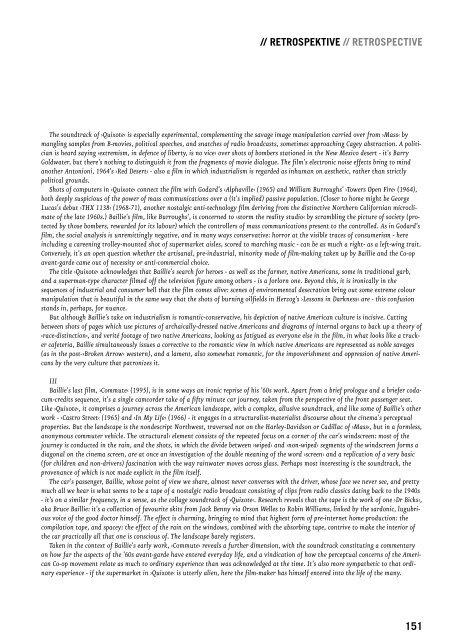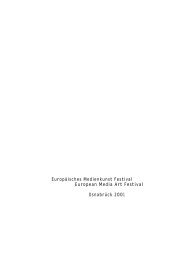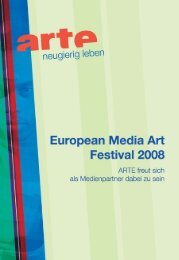You also want an ePaper? Increase the reach of your titles
YUMPU automatically turns print PDFs into web optimized ePapers that Google loves.
RETROSPEKTIVE // RETROSPECTIVE<br />
The soundtrack of ›Quixote‹ is especially experimental, complementing the savage image manipulation carried over from ›Mass‹ by<br />
mangling samples from B-movies, political speeches, and snatches of radio broadcasts, sometimes approaching Cagey abstraction. A politician<br />
is heard saying ›extremism, in defence of liberty, is no vice‹ over shots of bombers stationed in the New Mexico desert - it's Barry<br />
Goldwater, but there's nothing to distinguish it from the fragments of movie dialogue. The film's electronic noise effects bring to mind<br />
another Antonioni, 1964's ›Red Desert‹ - also a film in which industrialism is regarded as inhuman on aesthetic, rather than strictly<br />
political grounds.<br />
Shots of computers in ›Quixote‹ connect the film with Godard's ›Alphaville‹ (1965) and William Burroughs' ›Towers Open Fire‹ (1964),<br />
both deeply suspicious of the power of mass communications over a (it's implied) passive population. (Closer to home might be George<br />
Lucas's debut ›THX 1138‹ (1968-71), another nostalgic anti-technology film deriving from the distinctive Northern Californian microclimate<br />
of the late 1960s.) Baillie's film, like Burroughs', is concerned to ›storm the reality studio‹ by scrambling the picture of society (protected<br />
by those bombers, rewarded for its labour) which the controllers of mass communications present to the controlled. As in Godard's<br />
film, the social analysis is unremittingly negative, and in many ways conservative: horror at the visible traces of consumerism - here<br />
including a careening trolley-mounted shot of supermarket aisles, scored to marching music - can be as much a right- as a left-wing trait.<br />
Conversely, it's an open question whether the artisanal, pre-industrial, minority mode of film-making taken up by Baillie and the Co-op<br />
avant-garde came out of necessity or anti-commercial choice.<br />
The title ›Quixote‹ acknowledges that Baillie's search for heroes - as well as the farmer, native Americans, some in traditional garb,<br />
and a superman-type character filmed off the television figure among others - is a forlorn one. Beyond this, it is ironically in the<br />
sequences of industrial and consumer hell that the film comes alive: scenes of environmental desecration bring out some extreme colour<br />
manipulation that is beautiful in the same way that the shots of burning oilfields in Herzog's ›Lessons in Darkness‹ are - this confusion<br />
stands in, perhaps, for nuance.<br />
But although Baillie's take on industrialism is romantic-conservative, his depiction of native American culture is incisive. Cutting<br />
between shots of pages which use pictures of archaically-dressed native Americans and diagrams of internal organs to back up a theory of<br />
›race-distinction‹, and verité footage of two native Americans, looking as fatigued as everyone else in the film, in what looks like a trucker<br />
cafeteria, Baillie simultaneously issues a corrective to the romantic view in which native Americans are represented as noble savages<br />
(as in the post-›Broken Arrow‹ western), and a lament, also somewhat romantic, for the impoverishment and oppression of native Americans<br />
by the very culture that patronizes it.<br />
III<br />
Baillie's last film, ›Commute‹ (1995), is in some ways an ironic reprise of his '60s work. Apart from a brief prologue and a briefer codacum-credits<br />
sequence, it's a single camcorder take of a fifty minute car journey, taken from the perspective of the front passenger seat.<br />
Like ›Quixote‹, it comprises a journey across the American landscape, with a complex, allusive soundtrack, and like some of Baillie's other<br />
work - ›Castro Street‹ (1965) and ›In My Life‹ (1966) - it engages in a structuralist-materialist discourse about the cinema's perceptual<br />
properties. But the landscape is the nondescript Northwest, traversed not on the Harley-Davidson or Cadillac of ›Mass‹, but in a formless,<br />
anonymous commuter vehicle. The ›structural‹ element consists of the repeated focus on a corner of the car's windscreen: most of the<br />
journey is conducted in the rain, and the shots, in which the divide between ›wiped‹ and ›non-wiped‹ segments of the windscreen forms a<br />
diagonal on the cinema screen, are at once an investigation of the double meaning of the word ›screen‹ and a replication of a very basic<br />
(for children and non-drivers) fascination with the way rainwater moves across glass. Perhaps most interesting is the soundtrack, the<br />
provenance of which is not made explicit in the film itself.<br />
The car's passenger, Baillie, whose point of view we share, almost never converses with the driver, whose face we never see, and pretty<br />
much all we hear is what seems to be a tape of a nostalgic radio broadcast consisting of clips from radio classics dating back to the 1940s<br />
- it's on a similar frequency, in a sense, as the collage soundtrack of ›Quixote‹. Research reveals that the tape is the work of one ›Dr Bicks‹,<br />
aka Bruce Baillie: it's a collection of favourite skits from Jack Benny via Orson Welles to Robin Williams, linked by the sardonic, lugubrious<br />
voice of the good doctor himself. The effect is charming, bringing to mind that highest form of pre-internet home production: the<br />
compilation tape, and spacey: the effect of the rain on the windows, combined with the absorbing tape, contrive to make the interior of<br />
the car practically all that one is conscious of. The landscape barely registers.<br />
Taken in the context of Baillie's early work, ›Commute‹ reveals a further dimension, with the soundtrack constituting a commentary<br />
on how far the aspects of the '60s avant-garde have entered everyday life, and a vindication of how the perceptual concerns of the American<br />
Co-op movement relate as much to ordinary experience than was acknowledged at the time. It's also more sympathetic to that ordinary<br />
experience - if the supermarket in ›Quixote‹ is utterly alien, here the film-maker has himself entered into the life of the many.<br />
151












